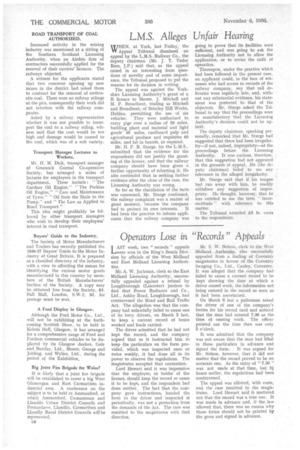L.M.S. Alleges
Page 42

If you've noticed an error in this article please click here to report it so we can fix it.
Unfair Hearing
WHEN, at York, last Friday, the VV Appeal Tribunal dismissed an appeal by the L.M.S. Railway Co., the deputy chairman (Mr. J. T. Tudor Rees, J.P.) said that, as the appeal raised in an interesting form questions of novelty and of some importance, the Tribunal proposed to put the reasons for its decision in writing.
The appeal was against the Yorkshire Licensing Authority's grant of a B licence to Messrs. J. Mitchell and M. P. Broadbent, trading as Mitchell and Broadbent, of Brierley Hill Works, Halifax, permitting the use of six vehicles. They were authorized to carry pigs over a radius of 20 miles, building plant and material and light goods 40 miles, cardboard pulp and agricultural produce and requisites 65 miles, and fat in barrels, as required.
Mr. H. F. R. Sturge, for the L.M.S., submitted that the evidence for the respondents did not justify the granting of the licence, and that the railway company should have been given a further opportunity of rebutting it. He also contended that in seeking further evidence after the close of the case, the Licensing Authority was wrong.
So far as the elucidation of the facts was concerned, Mr. Sturge continued. the railway complaint was a matter of great moment, because the company had to protect its own interests. It had been the practice to inform appli: cants that the railway company was going to prove that its facilities were sufficient, and was going to ask the Licensing Authority not to allow the application, or to revise the radii of operation.
Thereupon, under the practice which had been followed in the present case. an applicant could, in the face of witnesses who had access to records of the railway company, say that rail deliveries were regularly late, and, with-: out any substantial evidence, his statement was preferred to that of the objectors. Mr. Sturge asked the Tribunal to say that the proceedings were so unsatisfactory that the Licensing Authority's decision could not be upheld, The deputy chairman, speaking personally, remarked that Mr. Sturge had suggested that there had been irregularity—if not, indeed, impropriety—at the proceedings before the Licensing Authority. It was curious, therefore. that this suggestion had not appeared in the grounds of appeal. He (the deputy chairman) failed to see any relevance in the alleged irregularity.
Mr. Sturge said that if his tongue had run away with him, he readily withdrew any suggestion of impropriety. He thought, however, that he was entitled to use the term " incorrectitude " with reference to this matter.
The Tribunal awarded £5 5s. costs to the respondents.












































































































